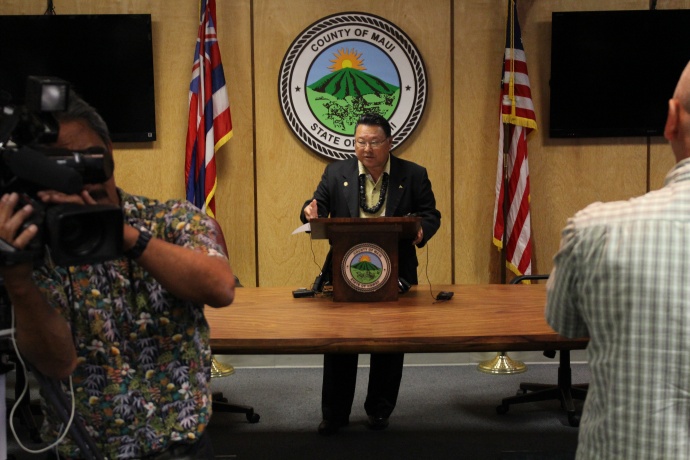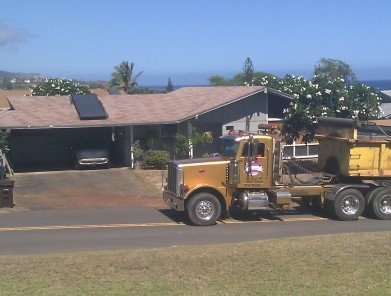Ask the Mayor: Disruptive Commercial Activities Near Homes
The mayor answers questions from the public in this series.
By Mayor Alan Arakawa
Q: I was devastated to hear about the terrible plane crash on Lana‘i. I watched the mayor’s press conference on TV, but wondered why the county couldn’t release the names of the victims when that information was already circulating in the news and in social media?
A: Yes, we were all devastated by the news. Our hearts go out to the victims and their families, and our prayers are with the three county employees who survived the crash. Maui Police Department (MPD) is responsible for identifying remains and releasing that information to the public once it is confirmed. Their investigators accomplish this through a number of ways, but it must be backed up by science/medical examination.
In some cases, positive identification cannot be made without some extreme measures, such as comparing dental records or even testing DNA. When this happens, it delays the release of information. However, these steps are necessary in order to make positive identification, and we support the department’s protocol.
Q: I bought a home and moved to Maui in October 2012. This is my permanent address so I filled out the homeowner exemption form before the Dec. 31, 2012 deadline and received my lower tax bill during 2013.
Now I’m told I was not eligible for the exemption in 2013 because my 2012 Hawaii state tax return was a part-time resident (N-15) form. If I am applying for the homeowner rate for 2013, why are they looking at 2012? That means a new-to-Maui resident will have to wait over a year, and possibly two years depending on what month they moved, to qualify for the homeowner exemption. Is that what the Maui code intended?
A: You can qualify for the real property tax homeowner exemption the assessment year after moving to Maui. If you moved here in 2012 you can qualify for the homeowner exemption in 2013 if you file a N-11 (full-time resident) Hawaii state individual income tax return for 2012 and meet the other criteria.
Maui County Code 3.48.450 specifies that the very generous homeowner exemption is intended for those who meet all of the following criteria: 1. Occupy the home as your primary residence; 2. Do not rent entire premise for any portion of the year; 3. File an N-11 Hawaii state individual income tax return for the year prior to receiving the exemption (non-resident and part-year resident N-15 forms do not qualify); and 4. Real property taxes are not delinquent. It should be noted that these criteria apply to everyone who is receiving a homeowner exemption, not just new applicants or people who just moved here.
Q: I have a new neighbor who is a contractor and uses his residential address in Kahului to advertise his business online.
Vehicles from this property are parked for a week at a time in front of my house, making it unsafe for me to back out of my own driveway. A typical day starts at 5:30 a.m. with employees reporting to work, parking their personal vehicles in front of surrounding homes. The piercing sounds of back-up horns blare out at 6 a.m. while trucks are loaded with supplies. By 6:30 a.m. power tools and hand tools scream, pound and vibrate as materials are cut and prepped. By 7 a.m. the owner is barking instructions to his employees. Because his property is converted into a baseyard/workshop, the noise continues into the evening, until 9:30 or 10 p.m.
The next day it all starts up again, 6 or 7 days a week. Is this type of commercial operation legal in a neighborhood zoned “residential”? Are there any county compliance issues involved, especially in regards to noise and vehicle parking? As a neighbor, what rights do I have against this type of commercial operation? Thanks for your time, and I always enjoy reading “Ask the Mayor.”
A: County code does not allow commercial operations such as the one you described, in residential areas unless the owner has a conditional permit that must be granted by the County Council.
The law was designed to protect residents from noise, parking issues and other impacts of businesses that don’t belong in neighborhoods. The Zoning Administration and Enforcement Division (ZAED) of the Planning Department is tasked with enforcing state and county land use laws, rules, codes, regulations and the general and community plans. ZAED receives complaints from the public in the form of a Request for Service (RFS) that can be filed online at www.mauicounty.gov/RFS, by calling ZAED at 270-7253, or in person at One Main Plaza (2200 Main St., Wailuku), in Suite 335.
Please keep in mind that the county’s policy does not allow anonymous complaints to be investigated, and that the name of the person filing the complaint will be disclosed to the alleged offender upon request. So to answer your final question, you have the right to file an RFS complaint with the understanding that if your contractor neighbor asks who filed the complaint, your identity will be disclosed.
Want to Ask the Mayor?
Submit your questions about County of Maui programs, services, operations or policies to Mayor Alan Arakawa via email: AskTheMayor@mauicounty.gov, phone: 270-7855 or mail: 200 S. High Street, 9th Floor, Wailuku, Hawaii 96793. Questions submitted will be considered for inclusion in the Ask the Mayor column.






_1768613517521.webp)

